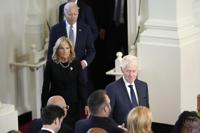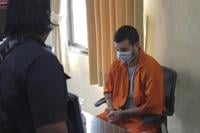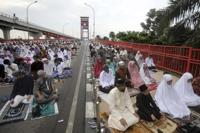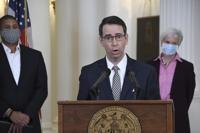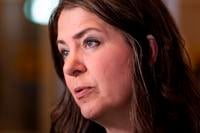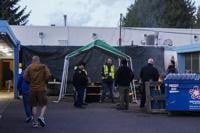PLAINS, Ga. (AP) — Her frail husband a silent witness, Rosalynn Carter was celebrated by her family and closest friends Wednesday in the same tiny town where she and Jimmy Carter were born, forever their home base as they climbed to the White House and traveled the world for humanitarian causes.
The former first lady, who at the age of 96, had her intimate funeral at in Plains, where she and her husband spent decades welcoming guests and where a wooden cross Jimmy Carter fashioned in his woodshop is displayed. Earlier tributes were held in nearby Americus and in Atlanta.
The former president, now 99 and in , sat in a wheelchair next to Maranatha's front pew, wearing a dark suit and tie to say goodbye to his .
Maranatha Pastor Tony Lowden said Rosalynn Carter “served every nation around the world” because she embraced the teachings of Jesus Christ and ”took it outside the walls” of the church.
“She would say to you today, ‘Don’t grieve for me, for now I’m free,’” Lowden said, continuing in Rosalynn's voice as he described her competitive nature and her belief in salvation and an afterlife. “'Jimmy tried to beat me here. I got here first. I won the prize. Tell him I beat him and I’m waiting on him.’"
"But,” Lowden continued, “she would say ‘don’t stop — there’s too many homeless people in the world. There’s still too many people who don’t have equal rights.’ ... She would tell you don’t stop. Become that virtuous woman. And men, if you’re listening, make room for the virtuous woman.”
The Carter family later accompanied her casket to the burial plot she'll one day share with her husband, who also attended a where two other presidents and all the living first ladies joined the extended before Wednesday's hometown funeral.
Vernita Sampson, a school bus driver and Plains native, drove a group of area high school students, all wearing Future Farmer of America jackets, to downtown Plains, where hundreds of people soaked up the history of the day and paid tribute to the former first lady along the motorcade route.
“They were people you could relate to, not this high standard where they were up here and, you know, we’re all down there," said Sampson, 58. “We never get used to death, no matter who we are or how long you have lived. But knowing that her suffering is no longer and to celebrate that she did live a long life, a very happy and productive life, that gives you joy.”
At the service, the mourning came with affectionate stories of her life and plenty of laughter.
“It occurs to me that dad got used to mom disagreeing with him because she was really good at it," son Jack Carter said. “And she became a partner in the true sense of the word, where they had equal footing.”
Many family members, including the former president, wore leis to celebrate how much Rosalynn Carter loved living in Hawaii during the couple's Navy years and learning to hula dance while her husband was stationed there.
Jimmy Carter met his future wife only a few days after his mother delivered her.
Coming from that town of about 600 — then and now — Rosalynn Carter changed lives across America and the developing world, mourners were told at her services this week. Jimmy Carter’s closest political adviser and a political force in her own right, she advocated for and underappreciated caregivers in millions of U.S. households. Traveling overseas, she fought disease, famine and the abuse of women and girls.
Even so, she never stopped being the small-town Southerner whose cooking repertoire leaned heavily on mayonnaise and pimento cheese, Jason Carter said as he told endearing stories about his grandmother.
The tributes covered the range of Rosalynn Carter's life.
Events in Atlanta reflected her grandest chapters. Mourners viewed her casket at her husband's presidential library, steps from The Carter Center they co-founded after leaving the White House. Then she was honored at a service filled with the music of a symphony chorus, a majestic pipe organ and fellow ambassadors Garth Brooks and Trisha Yearwood. President Joe Biden, former President Bill Clinton and the first ladies joined Jimmy Carter and their four children in the front row, in front of more than 1,000 congregants who wore suits, ties and dresses and filled an elegant Emory University church.
The proceedings Wednesday underscored her simpler constants. The sanctuary in Plains seats fewer people than the balcony at Glenn Memorial in Atlanta. Maranatha, tucked away at the edge of Plains where the town gives way to cotton fields, has no powerful organ, instead the cross her husband made and offering plates he turned on his lathe. Some congregants wore casual attire.
Yet her imprint went well beyond Plains.
Whenever she heard of suffering among her friends or neighbors, she would say, ”'Get me their phone numbers so that Jimmy and I can call them,’" Lowden said. But “Rosalynn Carter was someone who would look at children from Sudan or Cambodia and say ‘That’s my baby, too.’”
Several speakers addressed the former first lady's resilience, perhaps most evident when her husband was defeated by Ronald Reagan in 1980. “When they lost re-election, she thought the best part of her life was over,” Josh Carter said of his grandmother. Then came The Carter Center and its work on human rights, “and she knew that was the best part of their life.”
Elaine Larkin, who lives in nearby Ellaville, worked at the Rosalynn Carter Institute for Caregivers at the former first lady’s alma mater, Georgia Southwestern State University.
“We had one meeting where some people kept saying ’RAHZ-lyn,'” Larkin recalled, rolling her eyes at the common mispronunciation as she awaited the motorcade. “She just sat there and smiled. And when she got up to leave she leaned over to me and said very quietly, ‘Elaine, would you please tell them it’s ‘ROSE-lyn.’”
After the funeral, her children, grandchildren and great-grandchildren walked alongside an SUV carrying Jimmy Carter as Rosalynn Carter was escorted for the last time through the town where she lived for more than 80 of her 96 years.
The motorcade passed holiday lights and decorations including a photo collage in front of the downtown tree featuring the “First Lady of Plains.”
Her casket, topped with a spray of mixed flowers, was driven past the old high school where she was valedictorian during World War II, Plains Baptist Church where she and the former president were once outliers arguing for racial integration and the commercial district where she became Jimmy's indispensable partner in their peanut business. Then came the old train depot where she helped run the winning 1976 presidential campaign and Plains Methodist Church, where as an 18-year-old in 1946, she married young Navy Lt. Jimmy Carter.
The route ended in what locals call “the Carter compound,” property that includes their one-story ranch house, the pond where she fished and security outposts for the Secret Service agents who protected her for 47 years.
Her grave is within view of the front porch of the home where the 39th American president still lives.


